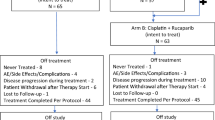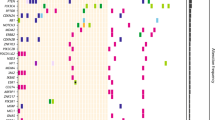Abstract
Breast cancer carrying BRCA mutation may be highly sensitive to DNA-damaging agents. We hypothesized a better outcome for BRCA-mutated (BRCAmut) metastatic breast cancer (MBC) patients receiving high-dose chemotherapy and autologous hematopoietic stem cell transplantation (HDC AHSCT) versus unaffected BRCA (BRCA wild type; (BRCAwt)) or patients without documented BRCA mutation (BRCA untested (BRCAut)). All female patients treated for MBC with AHSCT at Institut Paoli-Calmettes between 2003 and 2012 were included. BRCAmut and BRCAwt patients were identified from our institutional genetic database. Overall survival (OS) was the primary end point. A total of 235 patients were included. In all, 15 patients were BRCAmut, 62 BRCAwt and 149 BRCAut. In multivariate analyses, the BRCAmut status was an independent prognostic factor for OS (hazard ratio (HR): 3.08, 95% confidence interval (CI): 1.10–8.64, P=0.0326) and PFS (HR: 2.52, 95% CI :1.29–4.91, P=0.0069). In this large series of MBC receiving HDC AHSCT, we report a highly favorable survival outcome in the subset of patients with documented germline BRCA mutations.
This is a preview of subscription content, access via your institution
Access options
Subscribe to this journal
Receive 12 print issues and online access
$259.00 per year
only $21.58 per issue
Buy this article
- Purchase on Springer Link
- Instant access to full article PDF
Prices may be subject to local taxes which are calculated during checkout


Similar content being viewed by others
References
Antoniou A, Pharoah PDP, Narod S, Risch HA, Eyfjord JE, Hopper JL et al. Average risks of breast and ovarian cancer associated with BRCA1 or BRCA2 mutations detected in case series unselected for family history: a combined analysis of 22 studies. Am J Hum Genet 2003; 72: 1117–1130.
King M-C, Marks JH, Mandell JB,, New York Breast Cancer Study Group. Breast and ovarian cancer risks due to inherited mutations in BRCA1 and BRCA2. Science 2003; 302: 643–646.
Moynahan ME, Chiu JW, Koller BH, Jasin M . Brca1 controls homology-directed DNA repair. Mol Cell 1999; 4: 511–518.
Moynahan ME, Pierce AJ, Jasin M . BRCA2 is required for homology-directed repair of chromosomal breaks. Mol Cell 2001; 7: 263–272.
Berry DA, Ueno NT, Johnson MM, Lei X, Caputo J, Rodenhuis S et al. High-dose chemotherapy with autologous stem-cell support as adjuvant therapy in breast cancer: overview of 15 randomized trials. J Clin Oncol 2011; 29: 3214–3223.
Berry DA, Ueno NT, Johnson MM, Lei X, Caputo J, Smith DA et al. High-dose chemotherapy with autologous hematopoietic stem-cell transplantation in metastatic breast cancer: overview of six randomized trials. J Clin Oncol 2011; 29: 3224–3231.
Martino M, Lanza F, Pavesi L, Öztürk M, Blaise D, Núñez RL et al. High-dose chemotherapy and autologous hematopoietic stem cell transplantation as adjuvant treatment in high-risk breast cancer: data from the European Group for Blood and Marrow Transplantation Registry. Biol Blood Marrow Transplant 2015; 22: 475–481.
Sureda A, Bader P, Cesaro S, Dreger P, Duarte RF, Dufour C et al. Indications for allo- and auto-SCT for haematological diseases, solid tumours and immune disorders: current practice in Europe, 2015. Bone Marrow Transplant 2015; 50: 1037–1056.
Pedrazzoli P, Martinelli G, Gianni AM, Da Prada GA, Ballestrero A, Rosti G et al. Adjuvant high-dose chemotherapy with autologous hematopoietic stem cell support for high-risk primary breast cancer: results from the Italian national registry. Biol Blood Marrow Transplant 2014; 20: 501–506.
Huszno J, Budryk M, Kołosza Z, Nowara E . The influence of BRCA1/BRCA2 mutations on toxicity related to chemotherapy and radiotherapy in early breast cancer patients. Oncology 2013; 85: 278–282.
Kennedy RD, Quinn JE, Mullan PB, Johnston PG, Harkin DP . The role of BRCA1 in the cellular response to chemotherapy. J Natl Cancer Inst 2004; 96: 1659–1668.
Minotti G, Menna P, Salvatorelli E, Cairo G, Gianni L . Anthracyclines: molecular advances and pharmacologic developments in antitumor activity and cardiotoxicity. Pharmacol Rev 2004; 56: 185–229.
Kriege M, Seynaeve C, Meijers-Heijboer H, Collee JM, Menke-Pluymers MBE, Bartels CCM et al. Sensitivity to first-line chemotherapy for metastatic breast cancer in BRCA1 and BRCA2 mutation carriers. J Clin Oncol 2009; 27: 3764–3771.
Bayraktar S, Gutierrez-Barrera AM, Lin H, Elsayegh N, Tasbas T, Litton JK et al. Outcome of metastatic breast cancer in selected women with or without deleterious BRCA mutations. Clin Exp Metastasis 2013; 30: 631–642.
Kriege M, Jager A, Hooning MJ, Huijskens E, Blom J, van Deurzen CHM et al. The efficacy of taxane chemotherapy for metastatic breast cancer in BRCA1 and BRCA2 mutation carriers. Cancer 2012; 118: 899–907.
Isakoff SJ, Mayer EL, He L, Traina TA, Carey LA, Krag KJ et al. TBCRC009: a multicenter phase II clinical trial of platinum monotherapy with biomarker assessment in metastatic triple-negative breast cancer. J Clin Oncol 2015; 33: 1902–1909.
Delaloge S, Wolp-Diniz R, Byrski T, Blum JL, Gonçalves A, Campone M et al. Activity of trabectedin in germline BRCA1/2-mutated metastatic breast cancer: results of an international first-in-class phase II study. Ann Oncol 2014; 25: 1152–1158.
Martino M, Bottini A, Rosti G, Generali D, Secondino S, Barni S et al. Critical issues on high-dose chemotherapy with autologous hematopoietic progenitor cell transplantation in breast cancer patients. Expert Opin Biol Ther 2012; 12: 1505–1515.
Stadtmauer EA, O’Neill A, Goldstein LJ, Crilley PA, Mangan KF, Ingle JN et al. Conventional-dose chemotherapy compared with high-dose chemotherapy plus autologous hematopoietic stem-cell transplantation for metastatic breast cancer. Philadelphia Bone Marrow Transplant Group. N Engl J Med 2000; 342: 1069–1076.
Martino M, Ballestrero A, Zambelli A, Secondino S, Aieta M, Bengala C et al. Long-term survival in patients with metastatic breast cancer receiving intensified chemotherapy and stem cell rescue: data from the Italian registry. Bone Marrow Transplant 2013; 48: 414–418.
Schmid P, Schippinger W, Nitsch T, Huebner G, Heilmann V, Schultze W et al. Up-front tandem high-dose chemotherapy compared with standard chemotherapy with doxorubicin and paclitaxel in metastatic breast cancer: results of a randomized trial. J Clin Oncol 2005; 23: 432–440.
Lotz J-P, Curé H, Janvier M, Asselain B, Morvan F, Legros M et al. High-dose chemotherapy with haematopoietic stem cell transplantation for metastatic breast cancer patients: final results of the French multicentric randomised CMA/PEGASE 04 protocol. Eur J Cancer 2005; 41: 71–80.
Vredenburgh JJ, Coniglio D, Broadwater G, Jones RB, Ross M, Shpall EJ et al. Consolidation with high-dose combination alkylating agents with bone marrow transplantation significantly improves disease-free survival in hormone-insensitive metastatic breast cancer in complete remission compared with intensive standard-dose chemotherapy alone. Biol Blood Marrow Transplant 2006; 12: 195–203.
Biron P, Durand M, Roché H, Delozier T, Battista C, Fargeot P et al. Pegase 03: a prospective randomized phase III trial of FEC with or without high-dose thiotepa, cyclophosphamide and autologous stem cell transplantation in first-line treatment of metastatic breast cancer. Bone Marrow Transplant 2008; 41: 555–562.
Crump M, Gluck S, Tu D, Stewart D, Levine M, Kirkbride P et al. Randomized trial of high-dose chemotherapy with autologous peripheral-blood stem-cell support compared with standard-dose chemotherapy in women with metastatic breast cancer: NCIC MA.16. J Clin Oncol 2008; 26: 37–43.
Nitz UA, Mohrmann S, Fischer J, Lindemann W, Berdel WE, Jackisch C et al. Comparison of rapidly cycled tandem high-dose chemotherapy plus peripheral-blood stem-cell support versus dose-dense conventional chemotherapy for adjuvant treatment of high-risk breast cancer: results of a multicentre phase III trial. Lancet 2005; 366: 1935–1944.
Rodenhuis S, Bontenbal M, van Hoesel QGCM, Smit WM, Nooij MA, Voest EE et al. Efficacy of high-dose alkylating chemotherapy in HER2/neu-negative breast cancer. Ann Oncol 2006; 17: 588–596.
Hortobagyi GN, Buzdar AU, Theriault RL, Valero V, Frye D, Booser DJ et al. Randomized trial of high-dose chemotherapy and blood cell autografts for high-risk primary breast carcinoma. J Natl Cancer Inst 2000; 92: 225–233.
Rodenhuis S, Richel DJ, van der Wall E, Schornagel JH, Baars JW, Koning CC et al. Randomised trial of high-dose chemotherapy and haemopoietic progenitor-cell support in operable breast cancer with extensive axillary lymph-node involvement. Lancet 1998; 352: 515–521.
Tallman MS, Gray R, Robert NJ, LeMaistre CF, Osborne CK, Vaughan WP et al. Conventional adjuvant chemotherapy with or without high-dose chemotherapy and autologous stem-cell transplantation in high-risk breast cancer. N Engl J Med 2003; 349: 17–26.
Peters WP, Rosner GL, Vredenburgh JJ, Shpall EJ, Crump M, Richardson PG et al. Prospective, randomized comparison of high-dose chemotherapy with stem-cell support versus intermediate-dose chemotherapy after surgery and adjuvant chemotherapy in women with high-risk primary breast cancer: a report of CALGB 9082, SWOG 9114, and NCIC MA-13. J Clin Oncol 2005; 23: 2191–2200.
Zander AR, Kröger N, Schmoor C, Krüger W, Möbus V, Frickhofen N et al. High-dose chemotherapy with autologous hematopoietic stem-cell support compared with standard-dose chemotherapy in breast cancer patients with 10 or more positive lymph nodes: first results of a randomized trial. J Clin Oncol 2004; 22: 2273–2283.
Coombes RC, Howell A, Emson M, Peckitt C, Gallagher C, Bengala C et al. High dose chemotherapy and autologous stem cell transplantation as adjuvant therapy for primary breast cancer patients with four or more lymph nodes involved: long-term results of an international randomised trial. Ann Oncol 2005; 16: 726–734.
Bergh J, Wiklund T, Erikstein B, Lidbrink E, Lindman H, Malmström P et al. Tailored fluorouracil, epirubicin, and cyclophosphamide compared with marrow-supported high-dose chemotherapy as adjuvant treatment for high-risk breast cancer: a randomised trial. Scandinavian Breast Group 9401 study. Lancet 2000; 356: 1384–1391.
Roche H, Viens P, Biron P, Lotz J-P, Asselain B PEGASE Group. High-dose chemotherapy for breast cancer: the French PEGASE experience. Cancer Control 2003; 10: 42–47.
Leonard RCF, Lind M, Twelves C, Coleman R, van Belle S, Wilson C et al. Conventional adjuvant chemotherapy versus single-cycle, autograft-supported, high-dose, late-intensification chemotherapy in high-risk breast cancer patients: a randomized trial. J Natl Cancer Inst 2004; 96: 1076–1083.
International Breast Cancer Study Group, Basser RL, O’Neill A, Martinelli G, Green MD, Peccatori F et al. Multicycle dose-intensive chemotherapy for women with high-risk primary breast cancer: results of International Breast Cancer Study Group Trial 15-95. J Clin Oncol 2006; 24: 370–378.
Moore HCF, Green SJ, Gralow JR, Bearman SI, Lew D, Barlow WE et al. Intensive dose-dense compared with high-dose adjuvant chemotherapy for high-risk operable breast cancer: Southwest Oncology Group/Intergroup study 9623. J Clin Oncol 2007; 25: 1677–1682.
Turner N, Tutt A, Ashworth A . Hallmarks of “BRCAness” in sporadic cancers. Nat Rev Cancer 2004; 4: 814–819.
Muggia F, Safra T . “BRCAness” and its implications for platinum action in gynecologic cancer. Anticancer Res 2014; 34: 551–556.
Vollebergh MA, Lips EH, Nederlof PM, Wessels LFA, Schmidt MK, van Beers EH et al. An aCGH classifier derived from BRCA1-mutated breast cancer and benefit of high-dose platinum-based chemotherapy in HER2-negative breast cancer patients. Ann Oncol 2011; 22: 1561–1570.
Schouten PC, Marmé F, Aulmann S, Sinn H-P, van Essen HF, Ylstra B et al. Breast cancers with a BRCA1-like DNA copy number profile recur less often than expected after high-dose alkylating chemotherapy. Clin Cancer Res 2015; 21: 763–770.
Acknowledgements
This work was supported by SIRIC program (INCa-DGOS-Inserm 6038).
Author information
Authors and Affiliations
Corresponding author
Ethics declarations
Competing interests
The authors declare no conflict of interest.
Additional information
This work was presented in part at the 2015 EBMT Annual Meeting held in Istanbul, Turkey, 22–25 March 2015.
Rights and permissions
About this article
Cite this article
Boudin, L., Gonçalves, A., Sabatier, R. et al. Highly favorable outcome in BRCA-mutated metastatic breast cancer patients receiving high-dose chemotherapy and autologous hematopoietic stem cell transplantation. Bone Marrow Transplant 51, 1082–1086 (2016). https://doi.org/10.1038/bmt.2016.82
Received:
Revised:
Accepted:
Published:
Issue Date:
DOI: https://doi.org/10.1038/bmt.2016.82
This article is cited by
-
Real-world clinical outcomes of patients with BRCA-mutated, human epidermal growth factor receptor 2 (HER2)-negative metastatic breast cancer: a CancerLinQ® study
Breast Cancer Research and Treatment (2022)
-
Cytotoxic and targeted therapy for BRCA1/2-driven cancers
Hereditary Cancer in Clinical Practice (2021)
-
Indications for haematopoietic stem cell transplantation for haematological diseases, solid tumours and immune disorders: current practice in Europe, 2019
Bone Marrow Transplantation (2019)



